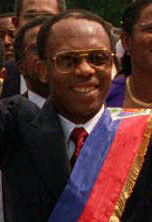A Quote by Thabo Mbeki
Haiti was a French colony, but in 1804, the slaves rose up and defeated the French and formed the Republic. For the last 200 years, Haiti has had a very unfortunate history.
Related Quotes
The whole history between Haiti and the Dominican Republic is complicated. We share the island of Hispaniola, and Haiti occupied the Dominican Republic for twenty-two years after 1804 for fear that the French and Spanish would come back and reinstitute slavery. So we have this unique situation of being two independent nations on the same island, but with each community having its own grievance.
Haiti was founderd by a righteous revolution in 1804 and became the first black republic. It was the first country to break the chains of slavery, the first to force Emperor Napoleon to retreat, and the only to aid Simón Bolívar in his struggle to liberate the indigenous people and slaves of Latin America from their colonial oppressors.
The spirit of Ubuntu, that once led Haiti to emerge as the first independent black nation in 1804, helped Venezuela, Colombia and Ecuador attain liberty, and inspired our forefathers to shed their blood for the United States' independence, cannot die. Today, this spirit of solidarity must and will empower all of us to rebuild Haiti.
There is this split between the Haiti of before the earthquake and the Haiti of after the earthquake. So when I'm writing anything set in Haiti now, whether fiction or nonfiction, always in the back of my mind is how people, including some of my own family members, have been affected not just by history and by the present but also by the earthquake.









































